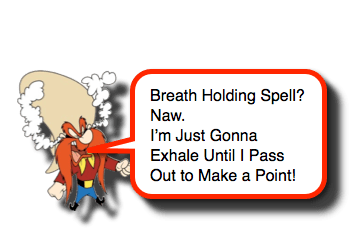Breath Holding Spell

 Kids do odd things. Some of these “odd things” we attribute to exploring and learning about the world (ex, putting objects in nostrils, ears, or mouth). Other times the “odd conditions” are not quite explained, but are well described as affecting only children (ex, Febrile Seizures). Since “oddities” often are not familiar, they can lead to significant parental, and even provider, concern. Let us take a minute to digest a Morsel on a potentially scary, although generally benign “oddity:” Breath Holding Spells.
Kids do odd things. Some of these “odd things” we attribute to exploring and learning about the world (ex, putting objects in nostrils, ears, or mouth). Other times the “odd conditions” are not quite explained, but are well described as affecting only children (ex, Febrile Seizures). Since “oddities” often are not familiar, they can lead to significant parental, and even provider, concern. Let us take a minute to digest a Morsel on a potentially scary, although generally benign “oddity:” Breath Holding Spells.
Breath Holding Spells: Basics
- Episode during which a child cries excessively and, as a part of that, holds her/his breath (usually on exhalation).
- May occur after a painful, frightening, or irritating event.
- May also occur in association with being disciplined or becoming angry.
- NOT INTENTIONAL (the child may be a “brat,” but he/she is not making him/herself pass out to prove a point!) [Goldman, 2015]
- The breath holding episode may lead to syncopal event / loss of consciousness.
- May be associated with Cyanosis
- May be associated with Pallor.
- May even demonstrate seizure-like activity immediately upon loss of consciousness.
- The period of unconsciousness is short-lived and spontaneously resolves.
- There is no post-ictal period.
- Mostly occurs in children 6 months to 18 months, but can occur up to 6 years of age.
- Occur in ~5% of all children.
Breath Holding Spells: Reasonable Evaluation
- Breath holding spells are defined by their benign course; however, …
- Always consider worst-first in the ED.
- ECG is reasonable
- It is relatively inexpensive and a good screening tool (not perfect, but reasonable).
- Look for evidence of dysrhythmia predisposing condition
- Prolonged QTc Syndrome
- Has a similar prevalence in patients with Breath Holding Spells as the general population. [Robinson, 2015]
- May cause an event that mimics a breath holding spell, so reasonable to get ECG. [Robinson, 2015]
- Some evidence of increased QT Dispersion (associated with increased risk of dysrhythmia and sudden death) in children with Breath Holding Spell. [Movahedian, 2016]
- Consider checking hemoglobin level
- Iron deficiency anemia is commonly found in these patients. [Yilmaz, 2014]
- If the child has good access to primary care, can defer this and iron studies to outpatient evaluation.
- If poor access to care, may want to check formal CBC.
- Treating iron deficiency anemia is also reasonable.
- Do NOT need referral for cardiology or neurology outpatient evaluations. [Yilmaz, 2014]
References
Movahedian AH1, Heidarzadeh Arani M2, Motaharizad D3, Mousavi GA4, Mosayebi Z5. Evaluation of QT Dispersion in Children with Breath Holding Spells. Iran J Child Neurol. 2016 Winter;10(1):25-30. PMID: 27057184. [PubMed] [Read by QxMD]
Robinson JA1, Bos JM1,2, Etheridge SP3, Ackerman MJ1,4,2. Breath Holding Spells in Children with Long QT Syndrome. Congenit Heart Dis. 2015 Jul-Aug;10(4):354-61. PMID: 25916402. [PubMed] [Read by QxMD]
Goldman RD. Breath-holding spells in infants. Can Fam Physician. 2015 Feb;61(2):149-50. PMID: 25676645. [PubMed] [Read by QxMD]
Yilmaz U1, Doksoz O2, Celik T3, Akinci G4, Mese T5, Sevim Yilmaz T6. The value of neurologic and cardiologic assessment in breath holding spells. Pak J Med Sci. 2014 Jan;30(1):59-64. PMID: 24639832. [PubMed] [Read by QxMD]
Rathore G1, Larsen P, Fernandez C, Parakh M. Diverse presentation of breath holding spells: two case reports with literature review. Case Rep Neurol Med. 2013;2013:603190. PMID: 24191206. [PubMed] [Read by QxMD]


[…] eclampsia, seizure mimics) and syncope (ex, hair grooming syncope, Brugada, prolonged QTc, breath holding spell). We also are painfully aware that even fractures deserve more attention than describing what bone […]
Fantastic morsel. Thanks Dr.Fox. F.Hay (Deputy Charge Nurse, Paeds ED, UK).
Thank you! I appreciate the appreciation!!
Involuntary breath holding spells can occur in neonates. My son, and many other children in several online support groups, exhibited IBHS from a very young age. My son was two days old when he had his first spell. Diagnosis confirmed by several pediatric specialists.
Correct. Neonates are different. Classic Breath Holding Spells do not occur in Neonates. Neonates who aren’t breathing deserve special attention. Thank you, sean
What is the definition of a classic breath holding spell?
[…] Not periodic breathing or breath holding spell. […]
[…] has had a breath-holding spell. Breath-holding spells typically occur in children 6-24 months of age and are triggered by an emotional challenge, such as […]